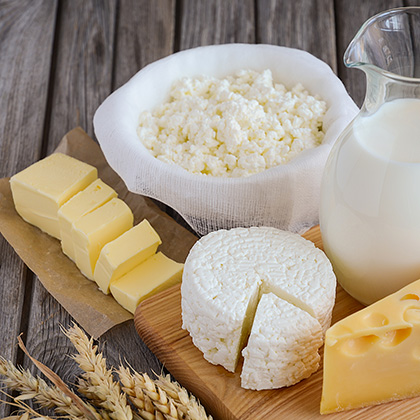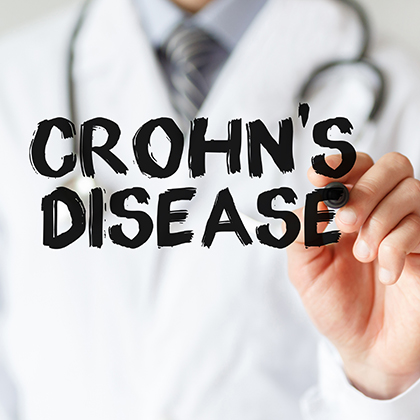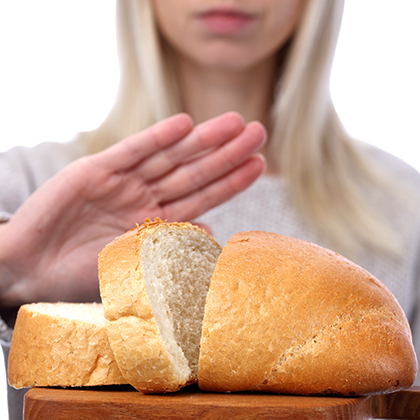
If you have irritable bowel syndrome (IBS), you may have recognised that some foods trigger your symptoms. Likely culprits are caffeine, alcohol, spicy and fatty foods, but according to the principles of the FODMAP diet, some carbohydrate-based foods may also contribute to IBS-type symptoms.
What does FODMAP stand for?
FODMAP stands for fermentable, oligo-saccharides, di-saccharides, mono-saccharides and polyols:
Fermentable: these are foods that, because they’re not fully digested or absorbed in your gastrointestinal tract, ferment in part of your gut (bowel) called the large bowel.
Oligo-saccharides: these are a type of carbohydrate, with IBS symptoms caused by two specific oligo-saccharides, namely fructans/fructo-oligosaccharides (found in wheat, rye and some vegetables such as onions, garlic and artichokes) and galacto-oligosaccharides (found in pulses, beans, legumes, cashew nuts and pistachio nuts).
Di-saccharides: these carbs include lactose, which is a sugar found in all animal milks (cow’s milk, goat’s milk etc) and milk products such as yoghurt.
Mono-saccharides: the best-known mono-saccharide is fructose, which is a sugar found in honey, some fruit and fruit juices (large amounts of fructose may be poorly absorbed by some people).
Polyols: these are sugar alcohols such as sorbitol, xylitol and mannitol, all of which are thought to be poorly absorbed by most people. Polyols are found in a few fruits and vegetables, but you can also find them in low-calorie products such as mints and chewing gums.
Developed by researchers from Monash University in Melbourne Australia, the FODMAP diet rates FODMAP foods as high and low, and recommends avoiding high-FODMAP foods and choosing low-FODMAP foods instead. It’s based on the idea that foods high in FODMAPS cause symptoms such as wind, bloating, loose stools and diarrhoea because:
-
They increase the amount of water in the small intestine
-
They are fermented by the bacteria that live in the large intestine, causing an increased amount of gas
Malabsorption of FODMAPS, say the experts behind the diet, is normal. But in people who don’t have IBS FODMAPs move through the bowel without causing any problems. However in those with IBS, the malabsorption of FODMAPS causes symptoms, theoretically because their gut is hypersensitive to gas production or they produce higher amounts of gas in their large intestine, or because they have an overgrowth of bacteria in their small intestine (i).
Indeed, according to experts at Kings College London, the FODMAP diet is effective for around 70 per cent of people with IBS who try it (ii). Researchers have also found people with IBS who follow a FODMAP diet can see an improvement in their symptoms within just one week (iii).
Is the FODMAP diet good for everyone?
If you’ve been diagnosed with IBS and you want to find a way of controlling your symptoms, the FODMAP diet may be worth considering. It may also be suitable if you have an inflammatory bowel disease such as ulcerative colitis or Crohn’s disease and are having digestive symptoms outside a flare-up of your condition, or even if you haven’t been diagnosed with IBS but have similar digestive symptoms.
However, while there’s a lot of information about FODMAPs and the FODMAP diet online, experts recommend you only follow the diet if you’re getting specialist advice from a registered dietitian. That’s because it’s not as simple as knowing which foods you should eat and which you should avoid. You also have to know how to read food labels, since many high-FODMAP ingredients are hidden in processed and packaged foods. Getting advice from a nutrition expert can also be helpful because they may help prevent nutrient deficiencies that often happen when you follow a restrictive diet.
Some nutrition professionals specialise in FODMAP diets – you can find some of them by checking the list of King’s College London FODMAP-trained dietitians. Many other NHS dietitians also offer advice about FODMAP diets: if you’ve been diagnosed with IBS or inflammatory bowel disease, your doctor or gastroenterologist can refer you.
FODMAP and IBS
IBS is common and affects around one in five people in the UK (iv). It can affect anyone of any age, though it most often starts in young adults. It causes a range of symptoms, the number of which and their severity vary from one IBS sufferer to the next. These symptoms often happen after eating or drinking and include the following:
-
Abdominal pain and cramping/spasms
-
Abdominal bloating and swelling
-
Excessive wind
-
Diarrhoea and/or constipation (doctors may categorise IBS sufferers as having mainly bloating and constipation-based symptoms, mainly diarrhoea symptoms or those who have both
-
A need to visit the toilet urgently
-
Feelings of not having emptied your bowels after going to the toilet
Some people may also have additional symptoms, such as nausea, headache, indigestion, heartburn, poor appetite, tiredness, backache, belching, muscle pains, frequent urination, anxiety or depression.
However we still don’t know exactly what causes IBS, though experts believe it may have something to do with overactivity of the gut (or part of the gut). There are lots of different treatments, some of which work for some people but not others. For many people with IBS dietary changes can be very helpful – whether that’s just a matter of eating more healthily or adopting a more specific approach, such as the FODMAP diet.
Find out more about IBS and how it’s treated by reading our guide.
Low and High FODMAP foods
The FODMAP diet can be quite complicated, which is why it’s recommended that you get support from a nutrition expert while following it. However, in a nutshell, here’s how the diet works, and which general foods are high and low in FODMAPS.
There are three stages to the FODMAP diet:
-
Restriction stage. For the first few weeks (typically four to eight weeks), you reduce your intake of FODMAPs by avoiding high-FODMAP foods and choosing low-FODMAP alternatives. This should be long enough for you to find out whether or not your symptoms respond to the FODMAP diet.
-
Reintroduction stage. If your symptoms improved during stage one, the next stage involves reintroducing some of the high-FODMAP foods you avoided previously. The aim of this stage is to find out which FODMAPs are most likely to trigger your symptoms, as well as how much of a high-FODMAP food you can eat before you start getting symptoms. So, for instance, you may reintroduce one food or FODMAP at a time for three days, increasing the amount each day and taking note of any symptoms before reintroducing the next.
-
Personalisation. During the last stage your aim is to only avoid foods that trigger your symptoms, rather than all high-FODMAP foods. This can help you get back to a more normal diet while still having fewer symptoms.
To give you an idea of which foods are high and which are low in FODMAPs, here’s a quick guide to some of the most common ones:
High-FODMAP foods
Vegetables: Artichoke, asparagus, garlic, onions, mushrooms, cauliflower, green peas, sugar snap peas
Fruits: Apples, peaches, pears, cherries, nectarines, mango, plums, watermelon, dried fruit, apple juice
Dairy (and alternatives): Cow’s milk, soya milk made from whole soya beans, condensed milk, evaporated milk, ice cream, yoghurt
Protein foods: Legumes, pulses, some marinated meats/poultry/seafood, some processed meats.
Breads and cereal products: Breads made from wheat, rye and barley, wheat-based breakfast cereals, biscuits, wheat-based pasta and noodles
Sugary foods: High fructose corn syrup, honey, sugar-free confectionary
Nuts and seeds: Cashews, pistachios
Low-FODMAP alternatives
Vegetables: Tomatoes, carrots, cucumbers, potatoes, lettuce, courgettes, green beans, aubergines, peppers
Fruits: Oranges, pineapples, grapes, strawberries, kiwi fruit, cantaloupe melon
Dairy (and alternatives): Almond milk, soya milk made from soya protein, hard cheeses, feta cheese, brie, camembert, lactose-free cow’s milk
Protein foods: Eggs, plain cooked meats/poultry/seafood, firm tofu, tempeh
Breads and cereal products: bread not made from wheat, rye or barley, cornflakes, oats, plain rice cakes, sourdough spelt bread, pasta made from quinoa, rice or corn
Sugary foods: Dark chocolate, table sugar, maple syrup
Nuts and seeds: Peanuts, walnuts, macadamia nuts, pumpkin seeds
Can supplements help?
Since there are many high-FODMAP foods to avoid during the first stage of the diet, your nutritionist may recommend you take a good-quality multivitamin and mineral supplement to make sure you’re not missing out on any essential nutrients. Choose a product that has good levels of all the main vitamins and minerals – find out what you need to know to make an informed decision by reading our guide to multivitamins and daily requirements.
Other supplements that may help relieve the symptoms of IBS include the following:
Live bacteria
Supplements that contain live bacteria (often called probiotics) are thought to promote a healthy intestinal bacterial environment, with studies showing they may help improve constipation (v) as well as diarrhoea (vi) associated with IBS. One review into the effectiveness and safety of probiotics in people with IBS suggests supplementation with multi-strain products can improve IBS symptoms – though it adds that further research is needed before probiotics can be used as a treatment for IBS (vii).
Peppermint oil
This is a traditional herbal remedy that has antispasmodic actions. Peppermint oil may help reduce gas production in the gut plus soothe pain and the gut wall. It’s widely used to treat IBS symptoms such as abdominal spasms, with several studies suggesting it’s a promising treatment (viii). One trial has shown peppermint oil may significantly improve abdominal pain, bloating, stool frequency and flatulence when compared with a placebo (dummy pill) (ix). A review of nine studies also concludes that peppermint oil is a safe and effective short-term treatment for IBS (x).
High-strength fish oils
The omega-3 fatty acids found in oily fish and fish oil supplements are widely thought to help fight inflammation, so they may be helpful if you have a condition such as inflammatory bowel disease. Meanwhile researchers behind a study carried out in Taiwan have found lower levels of DHA (one of the omega-3 fatty acids found in oily fish) and total omega-3 fatty acids are linked with IBS symptoms in women (xi). Scientists have also found fish oils could be useful as they may promote a healthy balance of gut bacteria (xii).
You can get a good supply of omega-3 fatty acids including DHA by eating oily fish such as salmon, herring, trout, mackerel or pilchards. However if you don’t like eating fish you can still benefit by taking a good-quality fish oil supplement (or, if you’re a vegetarian or vegan, by taking a supplement that contains omega-3 oils sourced from marine algae).
Having IBS can be challenging but there are several things that may help relieve your symptoms and allow you to get on with your life, including eating or avoiding certain foods or following the FODMAP diet. Find out more about a wide range of health and wellbeing conditions and how to help yourself by visiting our pharmacy health library.
References
(i) Available online: https://www.monashfodmap.com/ibs-central/i-have-ibs/research/
(ii) Available online: https://www.kcl.ac.uk/lsm/schools/life-course-sciences/departments/nutritional-sciences/projects/fodmaps/faq
(iii) Halmos EP et al. A diet low in FODMAPs reduces symptoms of irritable bowel syndrome. Gastroenterology. 2014 Jan;146(1):67-75.e5. Available online: https://www.gastrojournal.org/article/S0016-5085(13)01407-8/fulltext
(iv) Available online: https://patient.info/digestive-health/irritable-bowel-syndrome-leaflet
(v) Didari T et al., Effectiveness of probiotics in irritable bowel syndrome: Updated systematic review with meta-analysis.. World J Gastroenterol.. 2015 Mar 14;21(10):3072-3084.Available online: https://www.ncbi.nlm.nih.gov/pmc/articles/PMC4356930/
(vi) Bekkali. N, Bongers. ME, Van den Berg. MM, et al. The role of a probiotics mixture in the treatment of childhood constipation: a pilot study. Nutr J. 2007 Aug 4.
(vii) Heng-li Niu, Ji-Yuan Xiao. The efficacy and safety of probiotics in patients with irritable bowel syndrome: Evidence based on 35 randomized controlled trials. Int J Surg. 2020 Mar;75:116-127. Available online: https://www.sciencedirect.com/science/article/abs/pii/S1743919120301539?via%3Dihub
(viii) Capello G et al., Peppermint oil (Mintoil) in the treatment of irritable bowel syndrome: a prospective double blind placebo-controlled randomized trial. Dig Liver Dis. 2007 Jun;39(6):530-6.Available online: https://www.dldjournalonline.com/article/S1590-8658(07)00061-8/fulltext
(ix) Liu. JH, Chen. GH, Yeh. HZ, et al. Enteric-coated peppermint-oil capsules in the treatment of irritable bowel syndrome: a prospective, randomized trial. J Gastroenterol. 1997;32:765-768. Available online: https://link.springer.com/article/10.1007%2FBF02936952
(x) Khanna R, MacDonald JK, Levesque BG. Peppermint oil for the treatment of irritable bowel syndrome: a systematic review and meta-analysis. J Clin Gastroenterol. 2014 Jul;48(6):505-12. Available online: https://pubmed.ncbi.nlm.nih.gov/24100754/
(xi) Chua CS et al. Fatty acid components in Asian female patients with irritable bowel syndrome. Medicine. Dec 2017, Vol 96, issue 49, p e9094. Available online: https://journals.lww.com/md-journal/Fulltext/2017/12080/Fatty_acid_components_in_Asian_female_patients.123.aspx
(xii) Constantini L et al. Impact of Omega-3 Fatty acids on the Gut Microbiota. Int J Mol Sci. 2017 Dec; 18(12): 2645. Available online: https://www.ncbi.nlm.nih.gov/pmc/articles/PMC5751248/
Related Posts
Disclaimer: The information presented by Nature's Best is for informational purposes only. It is based on scientific studies (human, animal, or in vitro), clinical experience, or traditional usage as cited in each article. The results reported may not necessarily occur in all individuals. Self-treatment is not recommended for life-threatening conditions that require medical treatment under a doctor's care. For many of the conditions discussed, treatment with prescription or over the counter medication is also available. Consult your doctor, practitioner, and/or pharmacist for any health problem and before using any supplements or before making any changes in prescribed medications.

Christine
Christine Morgan has been a freelance health and wellbeing journalist for almost 20 years, having written for numerous publications including the Daily Mirror, S Magazine, Top Sante, Healthy, Woman & Home, Zest, Allergy, Healthy Times and Pregnancy & Birth; she has also edited several titles such as Women’ Health, Shine’s Real Health & Beauty and All About Health.
View More



